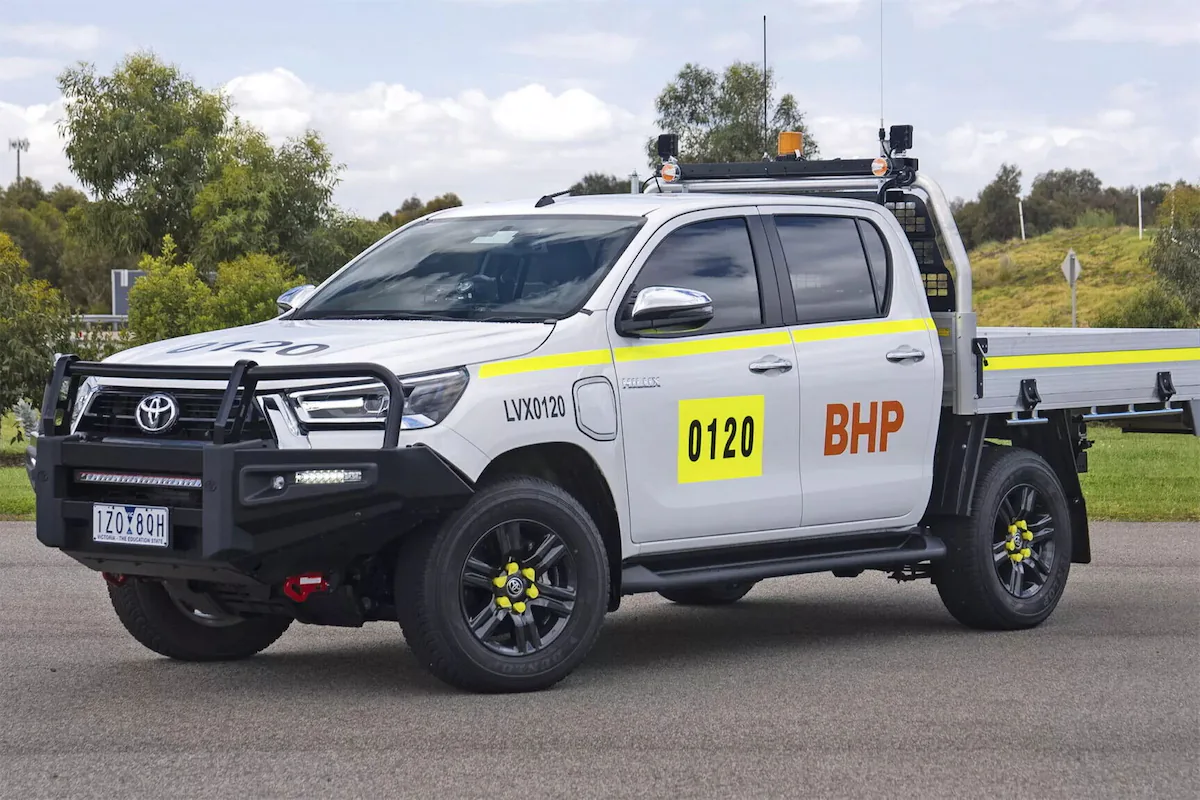
Toyota has taken a significant step towards electrification by building the first-ever electric Hilux prototype. This vehicle is set to undergo rigorous testing at an iron ore mine in Port Hedland, Western Australia, in partnership with mining giant Broken Hill Proprietary (BHP). For Toyota, there’s no better place to test their all-electric version of the iconic Hilux than in the grueling and unforgiving conditions of a mining site, where every element of the vehicle will be pushed to its limits.
The new electric Hilux isn’t just another prototype; it’s an attempt to prove that electric powertrains can match the standards of Toyota’s legendary workhorse. The vehicle has been based on a standard Hilux double cab and features a lightweight aluminum cargo platform. It’s also equipped with a front bull bar for added durability, but the real differentiators of this electric version are more subtle. The lack of an exhaust system and a charging port hidden behind a panel on the left fender are the key giveaways that this Hilux is not like the others. The design stays true to the original Hilux’s rugged and practical aesthetic, ensuring that the new electric model still feels familiar to long-time users.
Interestingly, Toyota hasn’t yet shared any technical details about the electric Hilux prototype. This decision leaves enthusiasts curious about the powertrain, battery range, and charging capabilities. However, what’s more important at this stage is the ambitious goal of these tests. Toyota’s partner, BHP, is the world’s largest mining company, according to U.S. media sources. BHP’s fleet in Australia alone has over 5,000 light-duty trucks, most of which are diesel-powered, and this serves as a high benchmark for any electric alternative. The collaboration aims to test whether an electric vehicle can withstand the same levels of wear and tear as these diesel trucks, which are often pushed to their absolute limits in harsh conditions.
Toyota wants the electric Hilux to reach a level where it can rival its diesel counterparts in terms of reliability and toughness—a goal that isn’t easy to achieve. Mining environments are notoriously demanding, with uneven terrain, extreme temperatures, and heavy loads. In fact, there seems to be a healthy amount of skepticism within Toyota itself, as the company appears less than enthusiastic about turning the Hilux into an EV. The question they, and likely many of their customers, are grappling with is why fix what isn’t broken? Diesel Hilux trucks have been dependable and hard-working for decades, so introducing an electric version is bound to face its share of challenges. Convincing customers to adopt an electric version will require proving that it can meet or exceed the standards set by its diesel predecessors in every possible aspect, from performance to reliability and even overall cost of ownership.
This skepticism is not without merit. Electric vehicles, especially those intended for industrial use, must overcome several hurdles, including limited range, charging infrastructure, and battery durability under extreme conditions. The outcome of this test could have significant implications not just for the Hilux but for the entire electric pickup market. If the electric Hilux manages to thrive in BHP’s mining operations, it could open doors for other industries that require rugged, reliable vehicles—like agriculture, forestry, and construction—to consider electric options.
This testing phase will be crucial in deciding the future of the electric Hilux. If it can prove itself in the harshest environments—like BHP’s demanding mining sites—it could pave the way for electric pickups in industries where durability and reliability are paramount. For now, it’s a bold experiment, but it reflects the growing push for sustainability in sectors that have long been dominated by fossil fuels. Toyota recognizes that the shift towards electrification is inevitable, but it wants to ensure that any electric model it introduces is worthy of the Hilux name. Whether the electric Hilux will live up to the legacy of its predecessors remains to be seen, but Toyota’s commitment to taking on this challenge is a noteworthy leap towards an electrified future.
It’s also worth considering the broader implications of this move. If Toyota can successfully develop an electric version of one of its most iconic and rugged models, it could signal the start of a major shift in the automotive industry. Electric pickups have been a tough nut to crack due to the demanding nature of their typical use cases, but this Hilux prototype is a step towards breaking that barrier. The results of these tests will not only influence Toyota’s future plans but could also impact how other manufacturers approach the electrification of heavy-duty vehicles. If successful, it could lead to more sustainable options in markets that have so far been heavily reliant on diesel engines.
In the end, the electric Hilux represents more than just a new vehicle—it represents Toyota’s willingness to innovate while respecting the legacy of their most trusted models. By partnering with BHP and subjecting the electric Hilux to the most challenging conditions imaginable, Toyota is positioning itself at the forefront of sustainable innovation in the pickup segment. The journey ahead is filled with challenges, but it also holds the promise of redefining what a tough, reliable pickup truck can be in an era increasingly focused on sustainability.

